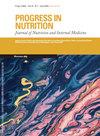新冠肺炎恐惧对学校管理者的影响与营养问题饮食行为之间的关系调查
4区 医学
Q4 Agricultural and Biological Sciences
引用次数: 13
摘要
目的:2019冠状病毒病大流行及其相关遏制行动已对粮食安全产生影响。本研究旨在评估沙特阿拉伯成年人在COVID-19宵禁期间的粮食安全状况,并描述他们的应对策略、饮食习惯和健康状况。设计:采用在线调查进行横断面研究,包括社会人口特征、食品安全状况、应对策略、饮食习惯和自评健康等问题。结果:通过在线调查共招募了605名居住在沙特阿拉伯的成年人。粮食不安全的总体发生率为28.4% (n= 172)。在受教育程度和收入水平较低的男性中,以及在租房的参与者中,粮食不安全状况明显更高。研究发现,四种类型的粮食安全群体在许多应对策略上存在显著差异。应对策略总分与食品安全状况呈负相关(分别为0.94 +/- 1.59、2.78 +/- 2.44、6.43 +/- 2.76、7.34 +/- 2.20,p < 0.001)。与食物安全的参与者相比,食物不安全的参与者更有可能报告身体和心理健康状况不佳/一般(p< 0.001)。在COVID-19宵禁期间,粮食不安全与日常饮食习惯的变化显著相关(p < 0.001)。结论:研究结果表明,食品不安全可能对成年人的健康和饮食习惯产生潜在影响。各国政府需要在地方和全球层面采取关键行动并采取全面政策,以确保人民的粮食安全。本文章由计算机程序翻译,如有差异,请以英文原文为准。
Investigation of associations between the effects of COVID-19 fear on school administrators and nutrition an problematic eating behaviors
Objective: The COVID-19 pandemic and its related containment actions have impacted food security. This study aimed to assess food security status of adults in Saudi Arabia during the COVID-19 curfew, and describe their coping strategies, eating habits, and health conditions. Design: A cross-sectional study was conducted using an online survey, which included questions on sociodemographic characteristics, food security status, coping strategies, eating habits and self-rated health. Results: A total of 605 adults living in Saudi Arabia were recruited through an online survey. The overall prevalence of food insecurity was 28.4% (n= 172). Food insecurity was significantly higher among males with lower education and income level, and in participants living in rented properties. Numerous coping strategies were found to be significantly different between four types of food security groups. The total score of coping strategies was negatively associated with food security status (0.94 +/- 1.59, 2.78 +/- 2.44, 6.43 +/- 2.76, 7.34 +/- 2.20, respectively, p < 0.001). Food-insecure participants were significantly more likely to report poor/fair physical and mental health, compared to food-secure participants (p< 0.001). Food insecurity was significantly associated with changes in usual eating habits during the COVID-19 curfew (p < 0.001). Conclusion: The results showed that food insecurity can have a potential impact on adults' health and eating habits. Governments need to take crucial actions and adopt comprehensive policies, both locally and globally, to ensure food security among populations.
求助全文
通过发布文献求助,成功后即可免费获取论文全文。
去求助
来源期刊

Progress in Nutrition
医学-营养学
CiteScore
1.40
自引率
0.00%
发文量
0
审稿时长
>12 weeks
期刊介绍:
Progress in Nutrition was founded in 1999 as an independent magazine, a multidisciplinary approach, dedicated to issues of nutrition and metabolism.
 求助内容:
求助内容: 应助结果提醒方式:
应助结果提醒方式:


